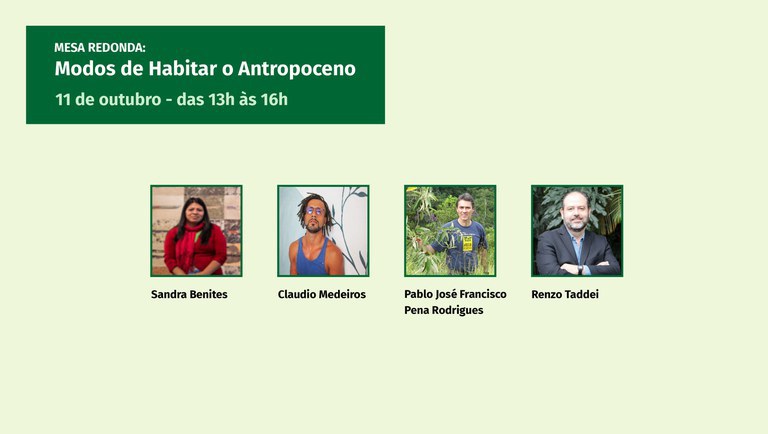Notícias
Round table at ENBT debates ways of inhabiting the Anthropocene

"Ways of inhabiting the Anthropocene" is the theme of the round table to be held on October 11, from 1 p.m. to 4 p.m., in the auditorium of the National School of Tropical Botany at the Rio de Janeiro Botanical Garden. Researchers Pablo José Francisco Pena Rodrigues (JBRJ), Sandra Benites (UFRJ), Claudio Medeiros (UFF) and Renzo Taddei (Unifesp) will be the speakers.
The event is part of the "Culture, Health and Humanities Encounters", promoted in partnership with the Interdisciplinary Laboratory of Studies and Research in Anthropology of Health of the Federal University of the State of Rio de Janeiro (UniRio) and the Cultural Center of the Ministry of Health.
Pablo José Francisco Pena Rodrigues is a biologist and researcher at the Instituto de Pesquisas Jardim Botânico do Rio de Janeiro (JBRJ), and conducts studies in ecology, with an emphasis on tropical forests and anthropogenic effects on biodiversity. He is the author of the bio-evolutionary Anthropocene hypothesis, published in 2019 in the journal Biological Theory.
Sandra Benites is one of today's most prominent indigenous thinkers. She has a master's degree and is a PhD candidate in social anthropology at the National Museum (UFRJ). She has worked in the fields of education, health, visual arts, and environmental and gender activism. She is the author of several academic papers. She was assistant curator at the São Paulo Museum of Art and is director of Visual Arts at Funarte.
Claudio Medeiros is an Angoleiro and professor of philosophy at the Fluminense Federal University, in the Postgraduate Program in Philosophy at UFRJ and in the Specialization in Decolonial Studies at PUC-SP. He has published Mármore & Barbárie (Kza1, 2019), Zumbimalê Pivete (Urutau, 2020), Experiments in Postcolonial Philosophy (Politeia, 2020) and History of the epidemic experience in Brazil(GLAC, 2021).
Renzo Taddei teaches anthropology and social studies of science and technology at the Federal University of São Paulo (Unifesp). His most recent research deals with the interface between scientific and traditional knowledge about the atmosphere. He published Meteorologists and Rain Prophets (Terceiro Nome, 2017), and is co-organizer of the book The Anthropocene: on ways of composing worlds (Fino Traço, 2022).